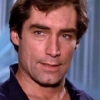Roger Ebert
#1

Posted 21 May 2011 - 05:48 PM
#2

Posted 21 May 2011 - 06:11 PM
#3

Posted 21 May 2011 - 07:17 PM
The Living Daylights
BY ROGER EBERT / July 31, 1987
The raw materials of the James Bond films are so familiar by now that the series can be revived only through an injection of humor. That is, unfortunately, the one area in which the new Bond, Timothy Dalton, seems to be deficient. He's a strong actor, he holds the screen well, he's good in the serious scenes, but he never quite seems to understand that it's all a joke.
The correct tone for the Bond films was established right at the start, with Sean Connery's quizzical eyebrows and sardonic smile. He understood that the Bond character was so preposterous that only lightheartedness could save him. The moment Bond began to act like a real man in a real world, all was lost. Roger Moore understood that, too, but I'm not sure Dalton does.
Dalton is rugged, dark and saturnine, and speaks with a cool authority. We can halfway believe him in some of his scenes. And that's a problem, because the scenes are intended to be preposterous. The best Bond movies always seem to be putting us on, to be supplying the most implausible and dangerous stunts in order to assure us they can't possibly be real. But in "The Living Daylights," there is a scene where Bond and his girlfriend escape danger by sliding down a snow-covered mountain in a cello case, and damned if Dalton doesn't look as if he thinks it's just barely possible.
The plot of the new movie is the usual grab bag of recent headlines and exotic locales. Bond, who is assigned to help a renegade Russian general defect to the West, stumbles across a plot involving a crooked American arms dealer, the war in Afghanistan and a plan to smuggle a half-billion dollars worth of opium. The story takes Bond from London to Prague, from mountains to deserts, from a chase down the slopes of Gibraltar to a fight that takes place while Bond and his enemy are hanging out of an airplane. The usual stuff.
One thing that isn't usual in this movie is Bond's sex life. No doubt because of the AIDS epidemic, Bond is not his usual promiscuous self, and he goes to bed with only one, or perhaps two, women in this whole film (it depends on whether you count the title sequence, where he parachutes onto the boat of a woman in a bikini). This sort of personal restraint is admirable, coming from Bond, but given his past sexual history surely it is the woman, not Bond, who is at risk.
The key female character is Kara (Maryam d'Abo), the Russian cellist, who gets involved in the plot with the Russian general, tries to work against Bond and eventually falls in love with him. As the only "Bond girl" in the movie, d'Abo has her assignment cut out for her, and unfortunately she's not equal to it. She doesn't have the charisma or the mystique to hold the screen with Bond (or Dalton) and is the least interesting love interest in any Bond film.
There's another problem. The Bond films succeed or fail on the basis of their villains, and Joe Don Baker, as the arms-dealing Whitaker, is not one of the great Bond villains. He's a kooky phony general who plays with toy soldiers and never seems truly diabolical. Without a great Bond girl, a great villain or a hero with a sense of humor, "The Living Daylights" belongs somewhere on the lower rungs of the Bond ladder. But there are some nice stunts.
Licence To Kill
BY ROGER EBERT / July 14, 1989
The James Bond movies have by now taken on the discipline of a sonnet or a kabuki drama: Every film follows the same story outline so rigidly that we can predict almost to the minute such obligatory developments as (1) the introduction of the villain's specialized hit man; (2) the long shot that establishes the villain's incredibly luxurious secret hideout; (3) the villain's fatal invitation to Bond to spend the night; (4) the moment when the villain's mistress falls for Bond; (5) the series of explosions destroying the secret fortress, and (6) the final spectacular stunt sequence.
Connoisseurs evaluate the elements in a Bond picture as if they were movements in a symphony, or courses in a meal. There are few surprises, and the changes are evolutionary, so that the latest Bond picture is recognizable as a successor to the first, "Dr. No," in 1962. Within this framework of tradition, "Licence to Kill" nevertheless manages to spring some interesting surprises. One is that the Bond character, as played now for the second time by Timothy Dalton, has become less of a British icon and more of an international action hero. The second is that the tempo has been picked up, possibly in response to the escalating pace of the Rambo and Indiana Jones movies. The third is that the villain has fairly modest aims, for a change; he doesn't want to rule the world, he only wants to be a cocaine billionaire.
I've grown uneasy lately about the fashion of portraying drug smugglers in glamorous lifestyles; they're viewed with some of the same glamor as gangsters were, in films of the 1930s. Sure, they die in the end, but they have a lot of fun in the meantime. In "Licence to Kill," however, the use of a drug kingpin named Sanchez (Robert Davi) and his henchmen (Anthony Zerbe, Frank McRae) is apparently part of an attempt to update the whole series and make it feel more contemporary.
There are still, of course, the obligatory scenes. The film begins with a sensationally unbelievable stunt sequence (Bond and friend lasso a plane, then parachute to a wedding ceremony). But then the action switches to the recognizable modern world in and around Key West, Fla., where the British agent finds himself involved in an operation to capture Sanchez and cut his pipeline of cocaine.
Like all Bond villains, Sanchez has unlimited resources and a beautiful mistress. His operation uses an underwater shark-nabbing company as its cover, and keeps a few sharks on hand so they can dine on federal agents. After Bond's friend, Felix Leiter, is mistreated by the bad guys, 007 begins a savage vendetta against Sanchez, which involves elaborate and violent stunt sequences in the air, on land, and underwater.
He is aided in his campaign by the beautiful Pam Bouvier (Carey Lowell, introduced as "Miss Kennedy, my executive secretary"), and saved more than once by Sanchez' beautiful mistress, Lupe Lamora (Talisa Soto). Both women are as beautiful as the historical Bond standard, but more modern - more competent, intelligent and capable, and not simply sex objects. This is no doubt part of the plan, announced before Dalton's first Bond picture, to de-emphasize the character's promiscuous sex life. Compared to his previous films, 007 is practically chaste this time.
My favorite moments in all the Bond pictures involve The Fallacy of the Talking Killer, in which the villain has Bond clearly in his power, and then, instead of killing him instantly, makes the mistake of talking just long enough for Bond to make a plan. The fallacy saves Bond's life two or three times in this movie - especially once when all that Davi has to do is slice his neck.
"Licence to Kill" ends, as all the Bond films do, with an extended chase and stunt sequence. This one involves some truly amazing stunt work, as three giant gasoline trucks speed down a twisting mountain road, while a helicopter and a light aircraft also join in the chase. There were moments when I was straining to spot the trickery, as a big semi-rig spun along tilted to one side, to miss a missile aimed by the bad guys. But the stunts all look convincing, and the effect of the closing sequence is exhilarating.
On the basis of this second performance as Bond, Dalton can have the role as long as he enjoys it. He makes an effective Bond - lacking Sean Connery's grace and humor, and Roger Moore's suave self-mockery, but with a lean tension and a toughness that is possibly more contemporary. The major difference between Dalton and the earlier Bonds is that he seems to prefer action to sex. But then so do movie audiences, these days. "Licence to Kill" is one of the best of the recent Bonds.
#4

Posted 21 May 2011 - 10:13 PM
What are people’s general feelings about Ebert’s original reviews of both Dalton movies?
Well, considering that he only gave one thumbs up for Licence to Kill I have to give him credit. He really had a good review for Licence to Kill where Siskel enjoyed it more than TLD, but still complained about it being too grainy, cheap looking and long.
#5

Posted 22 May 2011 - 12:18 AM
#6

Posted 22 May 2011 - 03:36 AM
Daniel Craig and the EON crew need to read this paragraph and be educated on what James Bond is supposed to be all about.
#7

Posted 22 May 2011 - 07:48 AM
"The correct tone for the Bond films was established right at the start, with Sean Connery's quizzical eyebrows and sardonic smile. He understood that the Bond character was so preposterous that only lightheartedness could save him. The moment Bond began to act like a real man in a real world, all was lost. Roger Moore understood that, too, but I'm not sure Dalton does." -Roger Ebert
Daniel Craig and the EON crew need to read this paragraph and be educated on what James Bond is supposed to be all about.
Well, it's one opinion amongst several, I suppose.
#8

Posted 22 May 2011 - 08:02 AM
"The correct tone for the Bond films was established right at the start, with Sean Connery's quizzical eyebrows and sardonic smile. He understood that the Bond character was so preposterous that only lightheartedness could save him. The moment Bond began to act like a real man in a real world, all was lost. Roger Moore understood that, too, but I'm not sure Dalton does." -Roger Ebert
Daniel Craig and the EON crew need to read this paragraph and be educated on what James Bond is supposed to be all about.
Well, realism never hurts. And Dalton is an awesome Bond for having the guts to be different.
#9

Posted 22 May 2011 - 08:16 AM
Well, realism never hurts.
Oh, it can.
#10

Posted 22 May 2011 - 01:42 PM
Without a great Bond girl, a great villain or a hero with a sense of humor, "The Living Daylights" belongs somewhere on the lower rungs of the Bond ladder. But there are some nice stunts.
Our asylums are full of people who don't know anything about Bond... or Fleming.
#11

Posted 25 May 2011 - 04:41 PM
Well, realism never hurts.
Oh, it can.
True, but look at the success of Casino Royale (2006)...
#12

Posted 25 May 2011 - 07:36 PM
Well, realism never hurts.
Oh, it can.
True, but look at the success of Casino Royale (2006)...
I don't judge a film's quality by box office figures or critical consensus.
CASINO ROYALE wasn't "realistic", even though it was marketed that way.
#13

Posted 25 May 2011 - 08:33 PM
#14

Posted 26 May 2011 - 03:39 AM
"The correct tone for the Bond films was established right at the start, with Sean Connery's quizzical eyebrows and sardonic smile. He understood that the Bond character was so preposterous that only lightheartedness could save him. The moment Bond began to act like a real man in a real world, all was lost. Roger Moore understood that, too, but I'm not sure Dalton does." -Roger Ebert
Daniel Craig and the EON crew need to read this paragraph and be educated on what James Bond is supposed to be all about.
I actually tend to agree with this. But, I also think it's okay to have more than one style and that it is actually necessary to switch it up (in terms of fantasy vs reality) every once and a while so the series doesn't become stale. There's no way the series would have lasted this long if they stuck to the "Goldfinger" model for every film.
Daniel Craig has said in interviews he would like to see Q and Moneypenny back. The guy is a fan of the series. In rebooting they had to scale back the traditional Bond elements and be subtle with the ones they did use otherwise the very modern-style of Craig's era wouldn't have worked as it was supposed to. Now, with the 3rd film they can go ahead and ramp it up a notch in terms of traditional Bond elements.
I really believe we will see more use of the Bond theme for sure. I think there is a good chance we see some gadgets (I hope), Q/Q Branch, and/or Moneypenny (based off this being the 3rd film, what's happened in the previous 2, and Craig's own statements on what he wants to happen going forward). I'm certainly not expecting another DAD or MR, but there are certainly ways to introduce those elements into the very modern, realistic, and gritty Craig era and make them work.
I don't think I would describe ANY James Bond movie as realistic. Some are more down to earth than others.
This is true.
#15

Posted 26 May 2011 - 11:45 PM
Well, realism never hurts.
Oh, it can.
True, but look at the success of Casino Royale (2006)...
I don't judge a film's quality by box office figures or critical consensus.
CASINO ROYALE wasn't "realistic", even though it was marketed that way.
Well, compared to Moonraker, which was also successful, it's very realistic.
#16

Posted 29 May 2011 - 02:52 AM
CASINO ROYALE wasn't "realistic", even though it was marketed that way.
I would think most viewers are smart enough to realize that Bond has always been fantasy. It should be obvious then that when someone claims or a particular film is marketed is as "realistic," it's in relative terms...not literal.
#17

Posted 20 August 2011 - 08:52 AM
And here's one Cardinal Rule Ebert has presented with which I strongly agree: a Bond film is only as good as its main villain. I believe this is irrefutable and is the simplest way to explain my general disappointment in most of the recent Bond films.
#18

Posted 20 August 2011 - 07:17 PM
I take Roger's Bond reviews in context. He watches (I believe) over a hundred new films a year. When it comes to Bond, he expects a certain formulaic recipe to be adhered to, yet he can complain about LALD being "too routine". He gives QOS a bad review for the wrong reasons ("Bond is not an action hero" as opposed to calling it out for technical sloppiness). Many times he makes good points (why doesn't the goon on the mountain simply cut Bond's rope in FYEO? OP's dialog is the worst in the series, etc.)
And here's one Cardinal Rule Ebert has presented with which I strongly agree: a Bond film is only as good as its main villain. I believe this is irrefutable and is the simplest way to explain my general disappointment in most of the recent Bond films.
I agree that the villain is hugely important (albeit not all important). Moonraker would be much worse a film without Drax.
#19

Posted 22 August 2011 - 06:48 AM
#20

Posted 22 August 2011 - 10:36 PM
I take Roger's Bond reviews in context. He watches (I believe) over a hundred new films a year. When it comes to Bond, he expects a certain formulaic recipe to be adhered to, yet he can complain about LALD being "too routine". He gives QOS a bad review for the wrong reasons ("Bond is not an action hero" as opposed to calling it out for technical sloppiness). Many times he makes good points (why doesn't the goon on the mountain simply cut Bond's rope in FYEO? OP's dialog is the worst in the series, etc.)
And here's one Cardinal Rule Ebert has presented with which I strongly agree: a Bond film is only as good as its main villain. I believe this is irrefutable and is the simplest way to explain my general disappointment in most of the recent Bond films.
I agree that the villain is hugely important (albeit not all important). Moonraker would be much worse a film without Drax.
Funny you bring up Drax, I just read Gene Siskel's review of Moonraker. He really slammed Lonsdale's portrayal as Drax. He wrote:
"French actor Michael Lonsdale plays the evil billionaire Hugo Drax, and frankly, Lonsdale is a big bore. He looks as though he has just been sucked dry by a vampire. His only slightly menacing characteristic is a goatee that makes him look like he spends most of his time in a dirty book store."
I disagree with Gene Siskel's review. I thought Lonsdale's low-key approach made him an effective villain, and his presence helped Moonraker more than it hurt it.
#21

Posted 23 August 2011 - 04:26 AM
And here's one Cardinal Rule Ebert has presented with which I strongly agree: a Bond film is only as good as its main villain. I believe this is irrefutable and is the simplest way to explain my general disappointment in most of the recent Bond films.
I have a problem with this comment. One, Brad Whittaker could have been an effective villain, but he was never given a chance to do much. But the last Bond/Whittaker showdown still proved to be one of my favorite scenes in TLD. Two, I thought that Georgi Koskov was a first rate villain. I have always considered Koskov to be one of the better Bond villains. He was smart and very good at hiding his true intent. He was the kind of guy who would shove a knife in your side, while putting you off guard with a smile. Auric Goldfinger is very . . . uh, dramatic. But I always thought he had the brains of a pea. And Franz Sanchez was another first-rate villain. I'm certain that Roger Ebert would disagree with me. And frankly, I don't care, because I had the good sense to stop paying attention to his opinions a long time ago.
#22

Posted 23 August 2011 - 03:20 PM
#23

Posted 23 August 2011 - 03:53 PM
#24

Posted 23 August 2011 - 07:22 PM
So Connery taunted Dr. No by saying "World domination - the same old dream." But seriously, how many villains apart from Stromberg and Drax actually wanted to rule the world?
Blofeld? No - he just wanted the world to pay him a tithe to leave it alone. Even in YOLT, when he said "We shall see a new power rise in the East" he meant China, not SPECTRE. How about Goldfinger? Kananga? Scaramanga? Kristatos? Khamal & Orlov? Zorin? Koskov & Whittaker?
Even after LTK, Carver only wanted to be influential, not in charge, while Graves wanted to dominate Korea and Japan, and make the west "tremble with fear."
It has become such a cliche among critics to claim that the villains in Bond movies are always bent on world domination. It sounds good, but it's lazy journalism, requiring no conscious recall of what actually came before. I think we can blame TSWLM and Moonraker for giving this cliche the validity it still unfairly enjoys.
'"Licence to Kill" ends, as all the Bond films do, with an extended chase and stunt sequence."
Really? And here I thought it was unusual for the chase to come after the destruction of the villain's HQ. Thank you, Roger, for setting me straight about that. And I missed the helicopter that was involved in the climactic chase with the three (count 'em, three) gasoline trucks. Oh, Roger, I wish I had your eye for detail.
Of course, I'm only an amateur fan who saw the film five times in the theatre - you're a professional critic who saw it once among a dozen other films that week, so what do I know?
Oh, Lord Ebert, if only everyone in the world came to me for my opinion on films I could afford to make
Edited by AMC Hornet, 23 August 2011 - 09:43 PM.
#25

Posted 23 August 2011 - 09:14 PM
Of course, I'm only an amateur fan who saw the film five times in the theatre - you're a professional critic who saw it once among a dozen other films that week, so what do I know?
Trust me, you know just as much as the professional critic. Frankly, I find them rather overrated. Forget the critic and only concern yourself with how YOU feel about a movie. On a personal level, it is a lot more important than some opinion of a critic, no matter how many years he or she has been writing movie reviews.
The one point that he made that was relatively interesting was that James Bond is not an action hero, and that that's actually where Quantum trips up (actually, Quantum trips up because there was no script so rather than cobble together a bunch of new dialogue, the team crafted action sequence after action sequence to fill the void).
And this is why I don't pay attention to Rogert Ebert or any other film critic.
#26

Posted 25 August 2011 - 08:40 AM
#27

Posted 26 August 2011 - 10:04 PM
We know you don't pay attention to Roger Ebert because you keep going on about how you don't pay attention to Roger Ebert; certainly one of the classic signs of apathy
Let me understand this. I posted several negative comments about Roger Ebert and other film critics and you have this need to insult me?
#28

Posted 27 August 2011 - 07:10 AM
#29

Posted 27 August 2011 - 12:40 PM
For example, I looked up some Siskel & Ebert reviews on YouTube recently. In one aired in 1983, they reviewed "Octopussy." Siskel enjoyed it, praising the stuntwork, action, as well as Moore and Maud Adams. Ebert complained the movie was the same old formula and he missed Connery.
Later that same year during a special Bond retrospective (after the release of "Never Say Never Again"), Siskel essentially condemned Moore, while Ebert said he enjoyed Moore's style. Two contradictory view in the span of less than a year.
I think you have to take these things in context and with a grain -- no, big spoonfull -- of salt.
#30

Posted 28 August 2011 - 04:36 AM
Interestingly I was literally just going through his reviews of the Bond films. His opinions aren't terrible, and I seem to sort of understand what he likes most about the character. His review of Quantum of Solace is scathing, though, and curiously rants about points he hailed in his review of Casino Royale (no Q or Moneypenny, etc). The one point that he made that was relatively interesting was that James Bond is not an action hero, and that that's actually where Quantum trips up (actually, Quantum trips up because there was no script so rather than cobble together a bunch of new dialogue, the team crafted action sequence after action sequence to fill the void). It's a compelling claim, and one that I sort of understand. There should be more to Bond than action, though when the gunfire does kick up, it has to be done in showstopping fashion. The action scenes in Quantum would be showstopping, if only there was more meat in between. Quantum has some of the best choreographed and paced action sequences in the franchise, but the stakes are just far too low. From the buzz we're hearing about Bond 23 (which, admittadly, there is very little of) it'll be a return to a more deliberately paced adventure. We shall see.
Quantum does not trip up because there is no script. In comparison with DAD, while there is indeed wall to wall action, especially in the first half of QOS, there are two HUGE differences between the two films. First the action does serve to advance the plot in QOS, where most of the action in DAD is just filler for the "thrill of the chase" as Graves eludes to. And second, the action is done FAR more realistically in QOS than in DAD. I believe James Berardinelli, another well respected film critic stated in his review of DAD that while they spent over 100 million dollars to film it, the horrid CGI made it look like it was filmed on the cheap. So while there is some similarites between DAD and QOS regarding the amount of action that is in both films, it shows how less reliance on CGI and more thought in the script makes all the difference in the world to how the final product comes out.
I do agree with you however that I do want to see a more dliberately paced direction in Bond 23. The wall to wall action served its purpose well in QOS, a film which portrayed Bond's revenge against the depth of Vesper Lynd. But agreed that I hope we see a little less action in the next film.










